|
|
|
Sort Order |
|
|
|
Items / Page
|
|
|
|
|
|
|
| Srl | Item |
| 1 |
ID:
152276
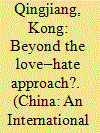

|
|
|
|
|
| Summary/Abstract |
There is a growing concern that China has become more assertive in its foreign policies. The fear is whether China’s economic growth may translate into modern and effective military advancement. This engenders the critical question of whether China feels comfortable in the current international order, which is defined by international law and institutions. This article argues that the Chinese approach to international law and institutions is tightly associated with its evolving perception of sovereignty, and national interests vis-à-vis international law and institutions, and is characterised by a love–hate attitude towards them. With its opening up, China now views multilateralism as a way for the international community to constrain the capriciousness of a superpower, and regards the international institutions simply as power-sharing development. However, China’s integration in international institutions represents its attempt to work within international norms to pursue its interests. China’s ambivalence towards international judicial settlement of disputes signals the historical legacy as well as China’s uneasiness with playing an active role in international institution-building and rule-making.
|
|
|
|
|
|
|
|
|
|
|
|
|
|
|
|
| 2 |
ID:
152274
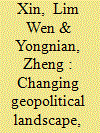

|
|
|
|
|
| Summary/Abstract |
As the world’s second-largest economy, China is set to gradually shape and reconstruct the international order. In 2013, the Chinese leadership announced the “One Belt, One Road” initiative as a strategic construct of Chinese peripheral influence and regional integration. As a great power, China needs to take the initiative to go beyond its responsibility as a “developing nation”. While China and the United States share many common interests and highly interdependent economic relations, a new world order is viable only with the cooperation of China and the United States.
|
|
|
|
|
|
|
|
|
|
|
|
|
|
|
|
| 3 |
ID:
152284


|
|
|
|
|
| Summary/Abstract |
China is under international pressure to provide more global public goods commensurate with its international status. While China has generally remained cautious in assuming too many responsibilities, there are signs that it is playing a more active role in at least two areas. First, China appears to be focused on reshaping the international economic and financial order to its advantage. In particular, it is actively pushing for the establishment of new financial institutions to, in its own words, complement existing multilateral development banks. Second, in combating piracy off the coast of Somalia, China has stepped up efforts to play up the softer aspects of its hardware contributions. These two aspects manifest a China that is ready and confident in providing the public goods that the international community welcomes.
|
|
|
|
|
|
|
|
|
|
|
|
|
|
|
|
| 4 |
ID:
152278


|
|
|
|
|
| Summary/Abstract |
Sino–Japanese political antagonism is, in part, driven by a clash between two “anti-status quo” powers. Ironically, both China and Japan, despite being neighbours, may view “the other” as an anti-status quo power threatening its own status, interests and aspirations in East Asia. Both are major Northeast Asian powers with their own concepts of regional and global order but their preferred orders invariably clash with each other. Apparently, China seeks to become a more complete great power while Japan aspires to be a “normal” state. The vector of these two national trajectories may well result in tension and conflict, threatening the regional status quo and leading to a new order in international affairs.
|
|
|
|
|
|
|
|
|
|
|
|
|
|
|
|
| 5 |
ID:
152277
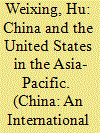

|
|
|
|
|
| Summary/Abstract |
The relationship between China and the United States is one between a rising power and an established power. Whether China is a revisionist power or a status quo power depends on how China and the United States get on with one another in the Asia-Pacific region. The US pivot to Asia and China’s rapid rise has created new dynamics for China–US relations in the region. A changing China–US relationship is also reshaping the strategic landscapes in the Asia-Pacific. US policy towards China has oscillated between containment and engagement since the end of the Cold War. In recent years, this policy has increasingly focused on the “engage but hedge” logic. The Obama administration’s pivot to Asia has rebalanced the focus of the “engage but hedge” policy and put more emphasis on political, economic and security competition with China in the Asia-Pacific region. Despite Xi Jinping’s proposal for a “new model of major power relations” between China and the United States, both countries are actually entering into a “new normal” type of power rivalry in the Asia-Pacific region.
|
|
|
|
|
|
|
|
|
|
|
|
|
|
|
|
| 6 |
ID:
152273


|
|
|
|
|
| Summary/Abstract |
Chinese President Xi Jinping has advocated a new model of international relations where all countries engage in mutually beneficial cooperation and work together to address common challenges. In his view, the model is in line with the incontrovertible world trend, and reflects the aspirations of countries and people for peace, development and prosperity. In short, all should strive to build a “community of common destiny”.
|
|
|
|
|
|
|
|
|
|
|
|
|
|
|
|
| 7 |
ID:
152279


|
|
|
|
|
| Summary/Abstract |
This article refutes the widely-speculated claims that China’s charm offensive aims to drive a wedge between South Korea and the United States to pull the former closer to its side. South Korea, at least in theory, remains unswayed and can hold its posture, recognising an important strategic factor that interstate diplomacy is interest-driven. China’s relations with South Korea are largely economics-driven. Economic motivations have compromised China’s and South Korea’s development of bilateral relations in the realm of hard politics, even though China is entirely cognizant of the North Korean factor, and of the diverging values that both countries uphold.
|
|
|
|
|
|
|
|
|
|
|
|
|
|
|
|
| 8 |
ID:
152283
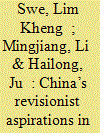

|
|
|
|
|
| Summary/Abstract |
China has significant revisionist objectives in Southeast Asia, including revamping the existing regional security architecture and strategic realignment, reforming the current regional political and security institutions, revising the rules and norms that help regulate regional relations, and aspiring to play a bigger role in regional agenda-setting. Beijing has achieved some success in changing the regional status quo through its good-neighbourliness policy over the past 20 years. But the intricate South China Sea issue is likely to prevent China from fulfilling its revisionist aspirations in the region in the decades to come.
|
|
|
|
|
|
|
|
|
|
|
|
|
|
|
|
| 9 |
ID:
152275


|
|
|
|
|
| Summary/Abstract |
This article investigates the evolution of Chinese discourse on the rise of China. The phrase “China’s rise” began to appear in the discourse of Western media in the early 1990s. China’s response to this phrase has witnessed some interesting changes over the years, from rejecting to reluctantly accepting, and to fully embracing it as a discourse reflecting the subtle changes in China’s identity and its strategic thinking. This article attempts to identify the sources and implications of the changes in the discourse on China’s rise in recent years.
|
|
|
|
|
|
|
|
|
|
|
|
|
|
|
|
| 10 |
ID:
152282
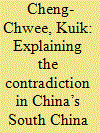

|
|
|
|
|
| Summary/Abstract |
China’s South China Sea policy in recent years has been marked by a mix of maritime assertiveness and economic-diplomatic inducement. This article argues that this contradiction is a result of both structural drivers and domestic imperatives. Structurally, the perceived opportunity after the global financial crisis and later, the perceived risk of a US-led encirclement after Obama’s “rebalancing to Asia” strategy have both pushed China to take a more hard-line approach to maritime disputes. However, the necessity to avert regional backlash has, on the other hand, compelled Beijing to counteract its maritime moves with active economic and diplomatic statecraft to reassure its smaller neighbours, albeit with mixed effects. Domestically, the contradiction is rooted in the ruling Communist Party of China elites’ needs to strike a balance between their different pathways of legitimation: while nationalist legitimation necessitates China to assert its sovereign rights, performance legitimation requires it to pursue a cooperative regional strategy via the “Belt and Road Initiative” so as to preserve a stable and productive environment needed for sustained domestic growth.
|
|
|
|
|
|
|
|
|
|
|
|
|
|
|
|
| 11 |
ID:
152281


|
|
|
|
|
| Summary/Abstract |
China and Russia belong to different civilisations that preclude a stable alliance. However, the two countries share views on many major international issues and are in a viable position to push for an alternative international order. This article employs a hybrid model to examine the dynamics in the Sino–Russo relations, taking factors such as external pressure, national identity, culture and history, overall national strategy as well as balance of power into account.
|
|
|
|
|
|
|
|
|
|
|
|
|
|
|
|
| 12 |
ID:
152280
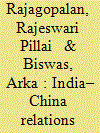

|
|
|
|
|
| Summary/Abstract |
This article analyses the contrary approaches and perceptions of India and China across the economic, political and military domains including the unresolved border and territorial issues, China’s South Asia policy, military modernisation and nuclear competition, border infrastructure and its impact on military build-up in the border areas. In particular, the article investigates how India–China relations have changed under Chinese President Xi Jinping. Although some continuity is discerned in China’s policies, there is also greater aggressiveness and more vigorous efforts to balance India on China’s part.
|
|
|
|
|
|
|
|
|
|
|
|
|
|
|
|
|
|
|
|
|